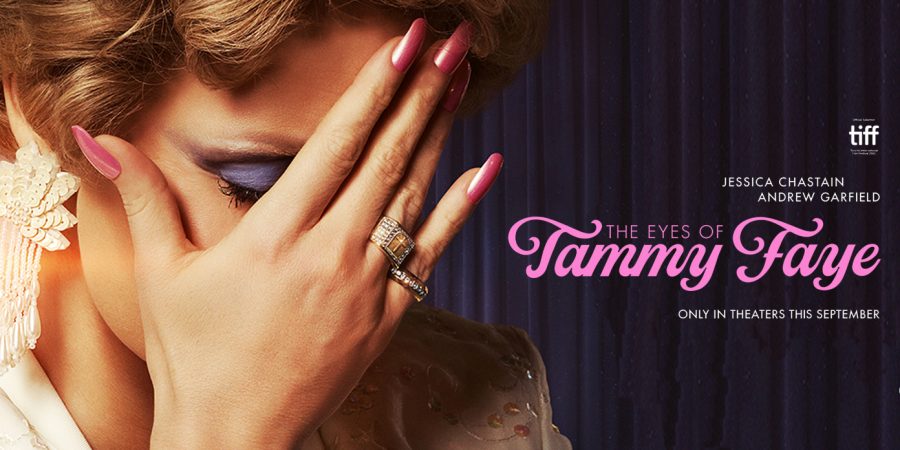Images in Review: ‘The Eyes of Tammy Faye’ offers captivating look at televangelism
October 6, 2021
If you are under the age of 40, you have probably never heard of Tammy Faye. However, you may have spent a weekday morning at home flipping through TV channels, and stumbled upon The 700 Club, a daily Christian television show, and subsequently wondered how anyone could possibly find it to be compelling. The 700 Club and its host Pat Robertson are two of the lasting remnants of the televangelist boom of the ’70s and ’80s that catapulted Tammy Faye Bakker and Jim Bakker to stardom with their potent combination of preaching and singing. Even though their highly publicized downfall crumbled their share of the televangelist empire, The Eyes of Tammy Faye, a biographical drama directed by Michael Showalter, sets out to humanize the larger-than-life televangelist figures who often seem more like caricatures than real people.
The real Tammy Faye (played by Jessica Chastain), met her future husband Andrew Bakker (played by Andrew Garfield) while she was a student at North Central Bible College in the 1960s. Soon after, the two decided to start a Christian ministry and travel the country to spread their message. First using puppet shows to attract children, they eventually started The 700 Club, which garnered an audience of millions. Their success came with unbelievable profit, which Jim Bakker later misused to silence women accusing him of sexual misconduct, turning their once untouchable empire into one associated with corruption and sex scandals.
When I first saw the trailer for The Eyes of Tammy Faye, which stars Jessica Chastain and Andrew Garfield, I’ll admit the main reason I wanted to watch the film was seeing Chastain in obvious prosthetics and eye-searing makeup singing “Jesus Keeps Takin’ Me Higher & Higher.” I had no idea who the Bakkers were aside from being an eccentric, too-nice-seeming Midwestern couple as shown in the trailer. After having seen the film, however, I realize that their presence is imbued in so much of American culture that maybe they are actually more familiar to me than I thought. While the film is a fairly predictable, somewhat bloated biopic that focuses primarily on Faye, there’s a lot to chew on about codependency, insecurity, naivete, and, of course, the scamming that is so often present in televangelism.
The high point of this film is the acting, particularly Chastain’s performance. Her sweet and honest portrayal of Faye never wades into caricature and instead complements and grounds the gaudy, caked-on makeup that she was known for. I forgot about the prosthetics that I initially found distracting in the beginning of the movie because of how completely she embodies this role, from her girlish Minnesotan voice to her heartbreaking revelations later on in the film. Chastain makes a meal of Faye’s charming (or annoying) quirks and clearly gives her all in the singing numbers. Garfield is also impressive, channeling all of his charisma into initially convincing us he is an all-American minister who just wants to do God’s work and bring his audience into the light.
The leads’ chemistry works from the get-go, showing their innocent, at times awkward courtship, and how earnest they were in their mission to preach to as large an audience as possible. The film chronicles their rise to the top of the televangelist ladder at the Praise The Lord (PTL) Network, and how eventually, the millions of dollars in donations they asked for and received from their audiences led to both legal and marital strife. The movie also excels at exposing the glaring (but maybe not so obvious at the time) behind-the-scenes politics of the early televangelist industry, introducing Pat Robertson and Jerry Falwell Sr. as competitors wholly concerned with viewership, profit, and fighting against what Falwell calls the “liberal, feminist, and homosexual agenda.” The film also credits them with ousting the Bakkers as the original hosts of the 700 Club and engineering their eventual fall from grace.
The center of the film, however, lies with Faye and the effort the film makes to engage with the vulnerable and kind parts of Faye and to show the extent of her victimhood by Bakker and the public, who failed to take her seriously and largely found her annoying. There are many moments in the film in which she is bullied, made fun of, and taken for granted by the people around her. Her makeup is the butt of her husband’s jokes, and her brief infidelity is exploited by Bakker to increase viewership and shame her. While Faye strives for an equal partnership, Bakker treats her as a prop for entertainment and talks down to her. In these moments, Chastain’s performance, full of vulnerability and emotional nuance, truly shines.
Chastain manages to remain sympathetic to the audience, through all of the drama and intrigue that unravels. Faye frequently attempts to extend compassion against her husband’s wishes to those discriminated against by the church, hosting segments on PTL with LGBTQA+ Christians and interviewing Steven Pieters, a minister with AIDS. Her accepting worldview forms a stark contrast to Bakker and Falwell’s corrupt and profit-motivated approach to Christianity, making her a lovable stand-out in the murky waters of televangelism. I was so taken with the portrayal of Faye that, when the film was over, I did a deep-dive on interviews Faye did once her career dwindled. Unsurprisingly, she is just as bubbly and captivating as her portrayal in the film, joking about the tabloid tragedy of her life and proving that even in bad times, Jesus did, in fact, keep on taking her higher and higher.









